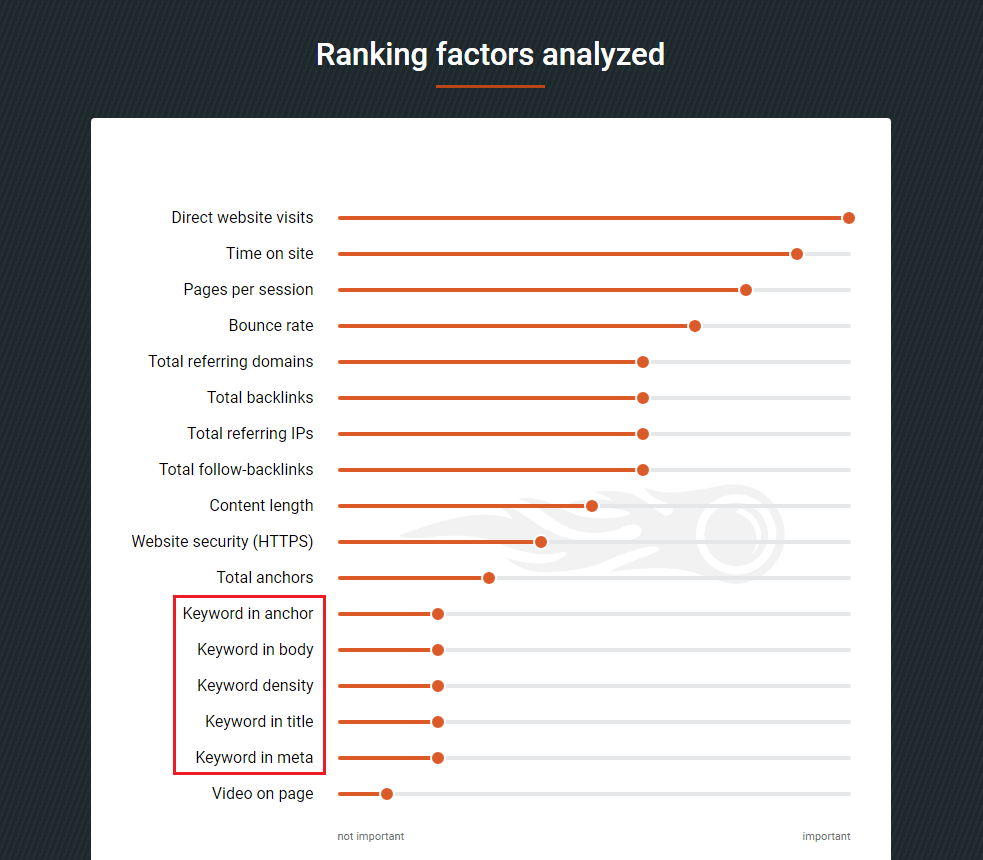Are keywords still a key ranking factor?

Author
Some of you may ask, “Why even question the importance of keywords in SEO? Of course they matter!” While others will think, “If there are so many ranking factors (which Google is changing all the time) then why should we focus on keywords? They’re dead!”
Let’s answer these questions and see how important keywords are in today’s world of SEO and content marketing.

By way of introduction
No one knows how Google really works. We only know that it changes so fast that we can barely keep up – it makes roughly 500-600 changes every year! This means that if you get a high position for a given keyword, there’s no guarantee you’ll keep it. Naturally you want to try.
So what do you do to reach top ranking positions and stay there? What do you look for the most: content quality, page speed, links, or… keywords?
Then and now
Let’s all go back to the year 2008. Those were the days! When your only worry was to make sure that you crammed your website with an awful amount of keywords and wait for the results. And that worked!
But nowadays Google is smarter. Something that was once widely used, is now a forbidden technique. Moreover, Google is learning how to understand human language and interpret it, so we can (and should) be more natural while producing content for our websites.
There have been a few major changes that affected the way Google “sees” keywords: Panda, Penguin, Hummingbird, and RankBrain.
Panda and Penguin attack
Introduced in February 2011, Panda was the first sign that we needed to care more about the quality of the content, and not only the keywords. This update helped to increase valuable search results by limiting the visibility of pages containing thin, short, or duplicate content.
One year later another algorithm was launched. Google Penguin was a further effort to reward high-quality websites. It also punished web pages that engaged in manipulative link schemes and keyword stuffing (which used to be a very popular tactic).
A precise, fast, and smart bird
When Google announced Hummingbird in 2013, it was a pretty big deal. It wasn’t just another change, but a formal name of the overall search algorithm. The main goal of the new algorithm was to better understand a searcher’s query (which coincides with one of Google’s primary aims – satisfying user intent). Hummingbird focuses on matching a query context to search results that rely on Google’s ability to parse intent. It’s like reading minds, isn’t it?

RankBrain
According to Google, RankBrain is one of the most powerful ranking signals in the search algorithm. It’s a machine-learning artificial intelligence system that helps process and sort the search results. In short, RankBrain has two major jobs: understanding keywords and measuring user satisfaction (by looking at their interaction with the results).
When it comes down to artificial intelligence it’s getting harder and harder to deceive Google with simple optimizing tricks.
As you can see, Google’s search algorithm is more advanced than just counting the keywords on a page. This is why purely focusing on keywords is outdated, but you don’t want to bury them just yet!
Google ranking factors – where are the keywords?
As stated by Search Engine Land (which made a nice periodic table of SEO Factors) there are over 200 major elements that affect your position in Google search results. We can divide them into two categories: On-page (these are factors mostly within the control of the publisher) and Off-page (influenced by others).
If there are so many ranking factors, should we care about keywords? How important are they? To find out, you can check some studies on the topic. For example, SEMrush conducted a study based on a scope of 600 000+ keywords, analyzing the 17 most prominent factors.

As you can see, behavioral factors are more important than keywords. Google wants to know how long people stay on your site. Do they browse deeper or refine their search? And of course, do they link to your website? This means that nailing the searcher’s intent with your content makes optimization work.
Research by Ahrefs has shown that almost 75% of pages that rank in Google’s top 10 don’t have a single mention of an exact keyword in their content. That’s nothing new, actually – Google admits that synonyms affect 70% of user searches across more than the 100 languages Google supports. From this point of view, the topic matters more than the exact keywords repeated over and over again.
But people are still using keyword phrases when looking for a specific topic. So how to use them to please both the user and search engine?
A few tips to maintain a good balance
Going to an extreme on either side is bad. Instead of abusing or underestimating keywords in your content, try to strike the right balance. Here are some practical tips for optimizing a website the “right” way:
In place of researching individual keywords, start exploring the themed concepts behind them and consider the bigger picture.
- Use keywords in strategic places
Instead of repeating the keyword a million times in the “body,” it’s better to focus on placing it in strategic positions on your site. These are: Page title, sub headers, URL, meta-descriptions, and image alts. Of course, don’t forget to provide thematically relevant content!
- Use different variations and synonyms
Let’s say it for the last time – Google understands synonyms and variations of words, even in difficult languages so there’s no need to use an exact match keyword all the time. Try some long-tails and related phrases.
Try not to hurt yourself with the misuse of keywords. Google hates keywords stuffing, hidden text and links, forcing keywords, etc. You should, too! Although these methods were (and still are) commonly used by those who wanted to get a higher ranking quickly, it won’t take long until Google sets a penalty.
- Take care of the user and help search engine
Keep in mind that you write for people but optimize for search engines. That’s why your content should always answer the searcher’s question, have the right structure, and just be attractive. Remember that search engines can’t read pages like people can, so it’s important to show with words what your website is about.

This balancing act is not a piece of cake – it takes time and experience. Don’t be afraid to experiment on your own with different tools and approaches.
Summing up
Answering the title question – keywords are still important in SEO, but they are not the most significant factors anymore. They can be helpful in small doses, however, SEO is far more complex than just keywords. Becoming an expert in your niche and focusing on satisfying user intent is the recipe to win the search results today.
In the constantly changing world of SEO, content marketers should also change their way of using keywords. Being up-to-date is the key!